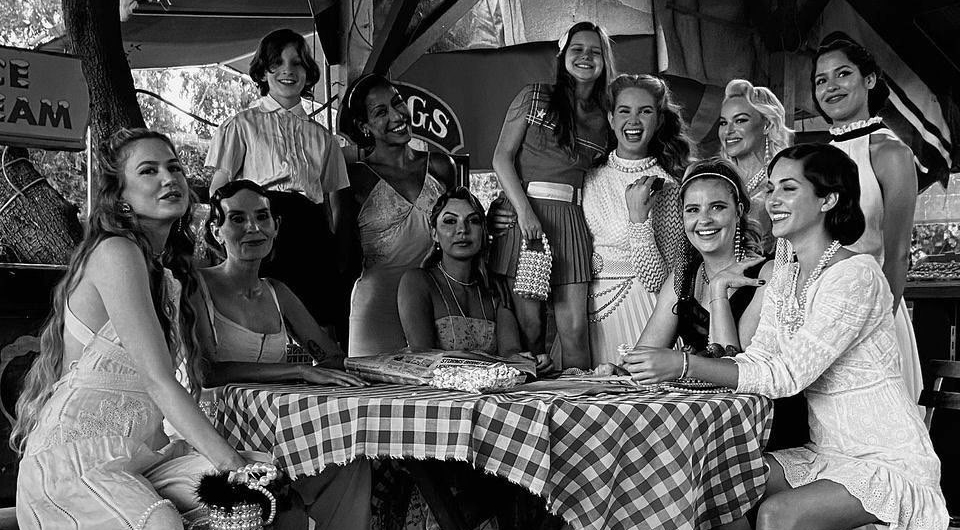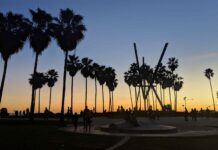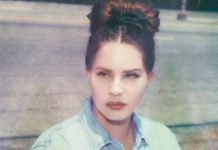The release of Lana Del Rey’s seventh album ‘Chemtrails Over The Country Club’ came amid relatively little fanfare considering it was a follow-up to the biggest record of 2019: ‘Norman Fucking Rockwell!’ There were reasons for this, outside of the paralysing nature of success, for no sooner had Lana released the lead single and artwork than she had been engulfed in a social media storm that was arguably of her own making. She’d given tone-deaf statements about race – her boyfriends had been rappers – and an oversimplification of why Trump supporters decided to storm the U.S. Capitol building, but perhaps the most notable pull quote came during her interview with Radio 1’s Annie Mac, where she declared that “our world’s greatest problem is not climate change or capitalism but sociopathy and narcissism.”
Whether she’s right or not remains to be seen. But narcissism takes on multiple forms, many of which are, interestingly enough, found on ‘Chemtrails’ – a beguiling and superbly-executed insight into Lana Del Rey and fame and how the two interact. Interrogating your own celebrity might well be a self-centred endeavour but it’s hardly a new phenomenon in the world of popular music, and it’s one that has often led to great art. During a period that’s tailor-made for navel-gazing and nostalgia, Lana has produced yet another timely record for us to gently brood over.
Opening track ‘White Dress’ is a beautiful statement of intent – a nostalgic overture that rifles through the record’s key themes: fame, self-mythologising, and a general malaise because “it was better back then”. Lana makes a point to stress her humble beginnings by returning to a time when she wasn’t Lana Del Rey at all, but a nineteen-year-old waitress still going by the name Lizzy Grant and “singing in the street / Down in the Men in Music Business Conference”. Her pre-fame existence is a rose-tinted, White Striped one and she’d return to it if she could – a sentiment that the album returns to again and again with its mournful musings on celebrity. There was power in having none, or as Lana whispers softly on the song’s bridge: “It made me feel like a god.”
A preoccupation with gods, both old and new, sits at the heart of the record. Lana tells her man to “stay real close to Jesus” and she spends time “contemplating God” but she also dabbles with mythologising her own work, giving a nod to ‘Mariners Apartment Complex’ on ‘Tulsa Jesus Freak’ and again on ‘Yosemite’ with the line “no more candle in the wind”. Many of the tracks on ‘Chemtrails’ weave together and reference one another as chapters in a longer ballad rather than individual folk tales. This mythology continues as Lana takes a road trip across America: from Orlando to Tulsa, Nebraska to the home of fame, Los Angeles. There are deliberate mispronunciations along the way – ‘Arkansas’ rather than ‘Arkansaw’, ‘meaned’ rather than ‘meant’ – as though she’s seeking a raw authenticity, but aside from the title track, there is less grappling with American identity post-Trump than you might expect from Miss Americana herself.
Jack Antonoff is back on production duties, playing almost every instrument and credited as a co-writer on eight out of the ten original tracks, but the more lushly orchestrated moments on ‘NFR!’ are noticeably absent this time around. ‘Chemtrails’, with its muted pianos and the gentle shuffle of an 808 drum machine, is less swooning than its predecessor but it picks up on the haunting vulnerability left behind by ‘hope is a dangerous thing for a woman like me to have.’ Lana’s melodies haven’t suffered either, particularly in the case of standout track (and possible Lord of the Rings reference), ‘Not All Who Wander Are Lost’, which couples soft guitar strums with sweet, textured vocal harmonies.
All this reflection leads to Lana looking back at musical icons and examining her own place in the canon. She role-plays as Tammy Wynette on ‘Breaking Up Slowly’ and breaks into a surprisingly bluesy, Janis Joplin-inspired bridge on ‘Dance Till We Die’, where she’s “covering Joni and dancing with Joan”. She does indeed cover Joni Mitchell, alongside Zella Day and an exquisitely well-cast Weyes Blood, in the closing track ‘For Free’. While Lana doesn’t quite share Joni’s sensibility as a travelling troubadour (one wonders if ‘Chemtrails’-era Lana would write a ‘Case of You’ character study about herself rather than a lover), the song reflects a similar crossroads moment in the two artists’ careers. When Lana sings of “the one-man-band…playin’ real good for free”, she’s looking back at the girl from ‘White Dress’, and when she “did it for free…for the right reasons” on ‘Yosemite’. Throughout the record, she yearns for that authenticity and what could happen if she packed everything up – “What would you do if I wouldn’t sing for them no more?” – but she doesn’t seem ready for that just yet: “Time after time, I think about leaving / But you know that I never do just ’cause you keep me believing”.
‘Chemtrails’ is Lana’s musical answer to Walt Whitman’s Song Of Myself; a poem that resonates enough to sit in the hallowed halls of her Twitter bio. “Do I contradict myself? Very well then, I contradict myself,” writes Whitman. “I am large – I contain multitudes.” Much of what she explores on this record is naturally contradictory – whether it be the seductive push and pull of fame or craving control while still remaining ‘Wild At Heart’ – but it is just as poetic and perceptive as Lana at her best.







